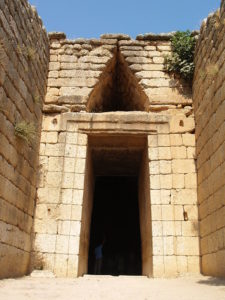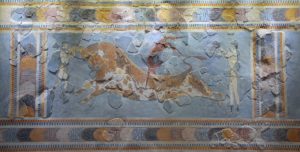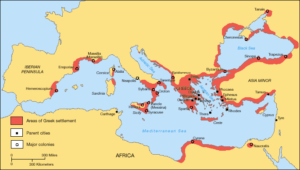
Greece is home to the first advanced civilizations in Europe and is considered the birthplace of Western civilization, beginning with the Cycladic civilization on the islands of the Aegean Sea at around 3200 BC, the Minoan civilization in Crete (2700–1500 BC), and then the Mycenaean civilization on the mainland (1600–1100 BC). These civilizations possessed writing, the Minoans using an undeciphered script known as Linear A, and the Mycenaeans writing the earliest attested form of Greek in Linear B.

The Mycenaeans gradually absorbed the Minoans, but collapsed violently around 1200 BC, along with other civilizations, during the regional event known as the Bronze Age collapse. This ushered in a period known as the Greek Dark Ages, from which written records are absent. Though the unearthed Linear B texts are too fragmentary for the reconstruction of the political landscape and can’t support the existence of a larger state, contemporary Hittite and Egyptian records suggest the presence of a single state under a “Great King” based in mainland Greece.
Archaic and Classical Period:
The end of the Dark Ages is traditionally dated to 776 BC, the year of the first Olympic Games. The Iliad and the Odyssey, the foundational texts of Western literature, are believed to have been composed by Homer in the 7th or 8th centuries BC. With the end of the Dark Ages, there emerged various kingdoms and city-states across the Greek peninsula, which spread to the shores of the Black Sea, Southern Italy (“Magna Graecia”) and Asia Minor. These states and their colonies reached great levels of prosperity that resulted in an unprecedented cultural boom, that of classical Greece, expressed in architecture, drama, science, mathematics and philosophy. In 508 BC, Cleisthenes instituted the world’s first democratic system of government in Athens.

By 500 BC, the Persian Empire controlled the Greek city states in Asia Minor and Macedonia. Attempts by some of the Greek city-states of Asia Minor to overthrow Persian rule failed, and Persia invaded the states of mainland Greece in 492 BC, but was forced to withdraw after a defeat at the Battle of Marathon in 490 BC. In response, the Greek city-states formed the Hellenic League in 481 BC, led by Sparta, which was the first historically recorded union of Greek states since the mythical union of the Trojan War. A second invasion by the Persians followed in 480 BC. Following decisive Greek victories in 480 and 479 BC at Salamis, Plataea, and Mycale, the Persians were forced to withdraw for a second time, marking their eventual withdrawal from all of their European territories. Led by Athens and Sparta, the Greek victories in the Greco-Persian Wars are considered a pivotal moment in world history, as the 50 years of peace that followed are known as the Golden Age of Athens, the seminal period of ancient Greek development that laid many of the foundations of Western civilization.
